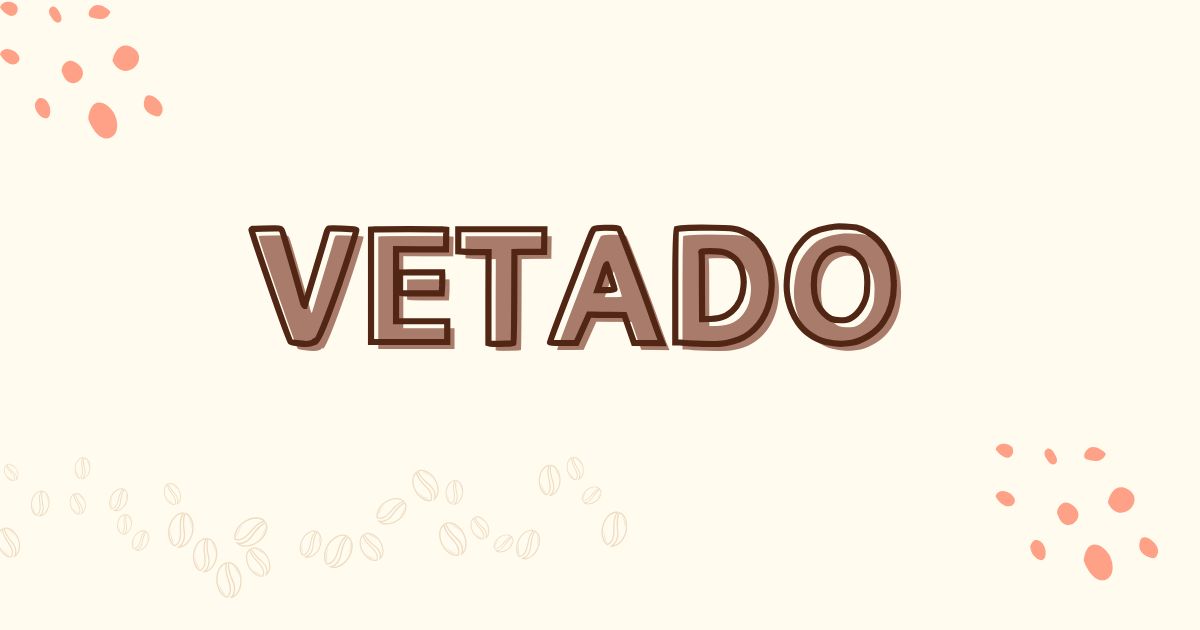“prohibited” in Spanish, its context, tone, and use in various spheres—legal, political, and cultural—offer deep insight into how societies establish boundaries. This article explores “vetado” from its linguistic roots to its real-world implications, helping you grasp the powerful nature of the word in everyday life.
Definition and Etymology of Vetado
“Vetado” originates from the Spanish verb “vetar”, which means to veto, ban, or forbid. It is commonly used to describe something that is officially prohibited. The Latin root vetare directly translates to “to forbid,” and has been carried into modern use, especially in political and legal contexts.
The Legal Implications of Being Vetado
In law, “vetado” holds weight. If a law, action, or proposal is vetado, it is stopped—often permanently. For example, in many democratic nations, presidents or governors have the power to veto legislation. When something is vetado in this context, it reflects a system of checks and balances.
Vetado in Government and Political Systems
Political bodies use the power of veto to maintain balance or express disagreement. The United Nations Security Council is a prime example. A single permanent member can veto a resolution, rendering it ineffective. This makes the term “vetado” synonymous with blocked progress in many diplomatic discussions.
Use of Vetado in Employment and Workplace Policies
In workplace environments, vetado can indicate restricted access or disqualification. An applicant may be vetado from future opportunities due to a policy violation or legal dispute. In other cases, employees may be vetado from accessing certain data or systems, enhancing security but also creating social divides.
Cultural Interpretations of Vetado in Society
In culture, especially within art and media, vetado can represent censorship or moral policing. A banned book or censored film is considered vetado. This sparks debates about freedom of expression and societal norms. What one group finds vetado, another might find liberating, revealing deep cultural contrasts.
Vetado in the Digital and Social Media Era
On digital platforms, content or users may be vetado (banned) for violating community guidelines. These actions often spark discussions about digital rights and platform bias. Whether it’s a celebrity getting blocked or a political figure being removed, the idea of being vetado online carries serious implications for public dialogue.
Religious and Moral Contexts of Vetado
Many religious doctrines include concepts of vetado behavior. Certain actions, foods, or practices may be prohibited, reinforcing moral codes. For example, in Islam, pork is vetado (haram), and in Judaism, certain foods are not kosher. These prohibitions shape identity, rituals, and community belonging.
Vetado in Education and Academic Spaces
Academic institutions often maintain codes of conduct, where plagiarism or cheating is vetado. Students caught engaging in such behaviors may be suspended or expelled, reinforcing integrity in education. Here, vetado acts as a deterrent and a safeguard for meritocracy.
Sports and the Concept of Vetado
In professional sports, an athlete may be vetado (banned) for doping, violence, or unethical behavior. This ensures fair play and upholds the spirit of competition. Famous cases of vetado players often highlight the importance of discipline and the consequences of crossing ethical lines.
Immigration Policies and Vetado Status
Many immigration systems issue entry bans to individuals considered threats or violators of visa terms. Being vetado from entering a country affects one’s freedom, livelihood, and sometimes safety. These cases underline the significance of legal compliance in international mobility.
Vetado in Business Transactions and Contracts
Businesses also use vetado in contracts to specify prohibited actions, such as disclosing confidential information or working with competitors. These “non-compete” or “non-disclosure” clauses protect interests but may limit personal freedom or career options for individuals.
Emotional and Social Exclusion: The Psychological Side of Vetado
Being socially vetado—excluded or rejected—can deeply affect one’s mental health. Whether it’s being left out of a friend group or community, the sense of being banned taps into core human needs for belonging and acceptance. Social vetado can lead to feelings of isolation and anxiety.
Language Barriers and Misunderstanding Vetado
Non-Spanish speakers may misunderstand the context of “vetado.” In translation, it might seem like a simple ban, but the cultural tone and legal implication often go unnoticed. Understanding vetado in its native language ensures better communication and legal awareness.
Vetado as a Tool of Control or Protection
In many cases, vetado acts as a double-edged sword. It can protect the community by filtering harmful actions or speech. However, it can also be misused for control, oppression, or silencing opposition. The intent behind vetado determines whether it promotes justice or enforces tyranny.
Conclusion
The word “vetado” is more than just a ban—it’s a reflection of power, authority, culture, and personal boundaries. From governments to online communities, from religious practices to sports, its presence is widespread and impactful. Understanding how and why something or someone becomes vetado can help you navigate complex social, legal, and moral systems with greater awareness. It also invites us to question: are we using vetado to protect, or to punish?
FAQs
What does “vetado” mean in English?
Vetado is a Spanish word meaning “banned” or “prohibited.” It is used to describe someone or something that is forbidden from participating or accessing something.
How is vetado used in legal systems?
In legal systems, vetado often refers to the rejection or banning of laws, individuals, or proposals. For instance, a presidential veto blocks a law from passing.
Can someone be vetado from social media?
Yes, users can be vetado (banned) for violating community guidelines, such as posting harmful content or engaging in hate speech.
is vetado permanent?
Not always. Some bans are temporary while others are indefinite or permanent, depending on the context and authority imposing it.
How does vetado affect personal rights?
Being vetado can limit personal rights such as free speech, movement, or employment. However, it can also protect communities from harm, depending on its application.















